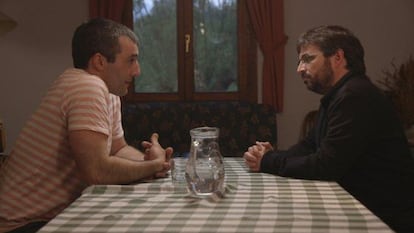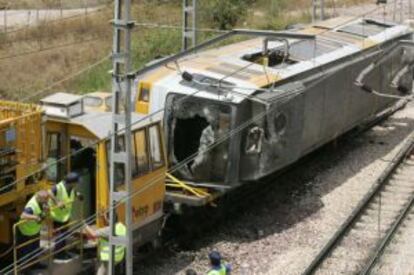TV interview with ex-ETA killer sets the social networks alight
Jordi Évole, host of popular show ‛Salvados,’ tried not to show empathy with Iñaki Rekarte


Jordi Évole did everything he could to keep his body language under control during this season’s last episode of Salvados (Saved).
The host of the popular investigative news program did not want to convey any kind of empathy with his guest: former ETA terrorist Iñaki Rekarte.
The normally voluble Évole also held himself back verbally this time. “This is the interview where I asked the fewest questions,” he reveals.
It is our will not to depend on the agenda that someone else is setting, but to set it ourselves by pushing the limits and taking risks”
Jordi Évole, host of 'Salvados'
Even so, the social networks were alight with reaction during the hour-long program, which aired on Sunday evening on the private network La Sexta.
“It started with attacks and very opposing comments that radically changed in tone as the interview progressed,” says the reporter.
It was the kind of thing that Évole, an expert at creating controversy, had been after for four years. During that time, current and former members of the Basque terrorist group had declined all requests for an interview.
“The answer was always the same: either they didn’t want to, or they told us to call back in a few months,” recalls Évole, 40.
So when a chance opened up in April to chat with Rekarte – who served 20 years for activities that included the murder of three people in an attack in Santander on February 19, 1992 – the journalist jumped at the opportunity.
The raw, self-critical testimony that emerged from the interview triggered a wave of reaction on the social networks and in the Spanish media. Many people accused the program chiefs of failing to give a voice to ETA’s victims.
“At other times I would have considered that essential,” admits Évole. “But in this case, besides the fact that this was a confession, it was ETA who came out looking the worst. Besides, not all victims issued that criticism against us; many others applauded our move.”
The man who began his television career playing a sarcastic sidekick to popular talk show host Andreu Buenafuente, and whose first instalments of Salvados relied heavily on humor, came across as resoundingly earnest in this latest episode of the award-winning program.
“I often have a problem with showing too much empathy with the person I am interviewing,” says Évole. “But I can say that this time, there was none of that. I really concentrated on remaining cold and distant, so that the audience would be able to judge the facts and the issues being discussed.”
A lot of people may not like it, but everyone deserves a second chance, or even a third”
Jordi Évole
The former ETA member often sought sympathy from his host with glances and gestures.
“I don’t know whether he found it or not, but I made an effort not to give my assent to anything that he said,” says Évole.
Silence also played a big role in the interview with Rekarte, who joined ETA at age 18, made his first explosives at 19, and started killing people the following year.
“They say that silence talks, but in this case it screams,” says the host.
Often, however, Rekarte filled the gaps with personal reflections about his time in prison, his feelings of remorse and the growing certainty that he had made a mistake. His thoughts have recently come out in book form as well.

No question had been prepared beforehand, says Évole, who is known for a spontaneous interviewing style.
“We never do. But in this case, the ball was hardly ever in my court,” he adds. “I barely intervened to give way to the story, which was the interesting part. Even Rekarte was at times amazed at what he was saying, aware that all those things of the past had been pure barbarity.”
Évole says that he has learned a lesson from this episode: “A lot of people may not like it, but everyone deserves a second chance, or even a third.”
With this controversial episode, Salvados stays true to form after covering Islamic terrorism shortly after the attack on the offices of the publication Charlie Hebdo in Paris or following Greek Finance Minister Yanis Varoufakis.
One of the show’s most famous episodes was an investigation of the 2006 subway crash in Valencia that killed 43 people, and the subsequent cover-up by Valencian authorities. After it aired in 2013, viewers were moved to protest to demand a fresh inquiry, as did the opposition in the regional parliament. This piece of investigative reporting earned Salvados industry awards in 2013 and 2014.
“It is our will not to depend on the agenda that someone else is setting, but to set it ourselves by pushing the limits and taking risks,” says Évole.
Tu suscripción se está usando en otro dispositivo
¿Quieres añadir otro usuario a tu suscripción?
Si continúas leyendo en este dispositivo, no se podrá leer en el otro.
FlechaTu suscripción se está usando en otro dispositivo y solo puedes acceder a EL PAÍS desde un dispositivo a la vez.
Si quieres compartir tu cuenta, cambia tu suscripción a la modalidad Premium, así podrás añadir otro usuario. Cada uno accederá con su propia cuenta de email, lo que os permitirá personalizar vuestra experiencia en EL PAÍS.
¿Tienes una suscripción de empresa? Accede aquí para contratar más cuentas.
En el caso de no saber quién está usando tu cuenta, te recomendamos cambiar tu contraseña aquí.
Si decides continuar compartiendo tu cuenta, este mensaje se mostrará en tu dispositivo y en el de la otra persona que está usando tu cuenta de forma indefinida, afectando a tu experiencia de lectura. Puedes consultar aquí los términos y condiciones de la suscripción digital.








































